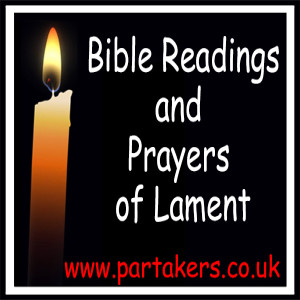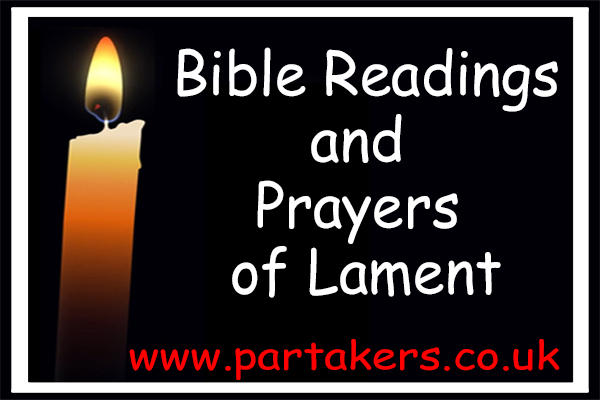
432.2K
Downloads
3367
Episodes
G’day and welcome to Partakers Christian Podcasts! Join us for uplifting Bible teaching, inspiring readings, heartfelt worship, powerful prayers, and fascinating church history. Whether you’re new to faith or growing deeper in your journey, we’re here to encourage and equip you. 🎧 Tune in, interact, and be inspired—wherever you are in the world.
G’day and welcome to Partakers Christian Podcasts! Join us for uplifting Bible teaching, inspiring readings, heartfelt worship, powerful prayers, and fascinating church history. Whether you’re new to faith or growing deeper in your journey, we’re here to encourage and equip you. 🎧 Tune in, interact, and be inspired—wherever you are in the world.
Episodes

Saturday Jan 31, 2026
Bible Reading - Psalms 31 to 35
Saturday Jan 31, 2026
Saturday Jan 31, 2026
Psalm 31 to Psalm 35
Often we hear the Psalms one by one, but today we offer you the chance to hear a group of Psalms read as a collection!
Psalm 31
For the director of music. A psalm of David.
1 In you, LORD, I have taken refuge;
let me never be put to shame;
deliver me in your righteousness.
2 Turn your ear to me,
come quickly to my rescue;
be my rock of refuge,
a strong fortress to save me.
3 Since you are my rock and my fortress,
for the sake of your name lead and guide me.
4 Keep me free from the trap that is set for me,
for you are my refuge.
5 Into your hands I commit my spirit;
deliver me, LORD, my faithful God.
6 I hate those who cling to worthless idols;
as for me, I trust in the LORD.
7 I will be glad and rejoice in your love,
for you saw my affliction
and knew the anguish of my soul.
8 You have not given me into the hands of the enemy
but have set my feet in a spacious place.
9 Be merciful to me, LORD, for I am in distress;
my eyes grow weak with sorrow,
my soul and body with grief.
10 My life is consumed by anguish
and my years by groaning;
my strength fails because of my affliction,
and my bones grow weak.
11 Because of all my enemies,
I am the utter contempt of my neighbors
and an object of dread to my closest friends—
those who see me on the street flee from me.
12 I am forgotten as though I were dead;
I have become like broken pottery.
13 For I hear many whispering,
“Terror on every side!”
They conspire against me
and plot to take my life.
14 But I trust in you, LORD;
I say, “You are my God.”
15 My times are in your hands;
deliver me from the hands of my enemies,
from those who pursue me.
16 Let your face shine on your servant;
save me in your unfailing love.
17 Let me not be put to shame, LORD,
for I have cried out to you;
but let the wicked be put to shame
and be silent in the realm of the dead.
18 Let their lying lips be silenced,
for with pride and contempt
they speak arrogantly against the righteous.
19 How abundant are the good things
that you have stored up for those who fear you,
that you bestow in the sight of all,
on those who take refuge in you.
20 In the shelter of your presence you hide them
from all human intrigues;
you keep them safe in your dwelling
from accusing tongues.
21 Praise be to the LORD,
for he showed me the wonders of his love
when I was in a city under siege.
22 In my alarm I said,
“I am cut off from your sight!”
Yet you heard my cry for mercy
when I called to you for help.
23 Love the LORD, all his faithful people!
The LORD preserves those who are true to him,
but the proud he pays back in full.
24 Be strong and take heart,
all you who hope in the LORD.
Psalm 32
Of David. A maskil.
1 Blessed is the one
whose transgressions are forgiven,
whose sins are covered.
2 Blessed is the one
whose sin the LORD does not count against them
and in whose spirit is no deceit.
3 When I kept silent,
my bones wasted away
through my groaning all day long.
4 For day and night
your hand was heavy on me;
my strength was sapped
as in the heat of summer.
5 Then I acknowledged my sin to you
and did not cover up my iniquity.
I said, “I will confess
my transgressions to the LORD.”
And you forgave
the guilt of my sin.
6 Therefore let all the faithful pray to you
while you may be found;
surely the rising of the mighty waters
will not reach them.
7 You are my hiding place;
you will protect me from trouble
and surround me with songs of deliverance.
8 I will instruct you and teach you in the way you should go;
I will counsel you with my loving eye on you.
9 Do not be like the horse or the mule,
which have no understanding
but must be controlled by bit and bridle
or they will not come to you.
10 Many are the woes of the wicked,
but the LORD’s unfailing love
surrounds the one who trusts in him.
11 Rejoice in the LORD and be glad, you righteous;
sing, all you who are upright in heart!
Psalm 33
1 Sing joyfully to the LORD, you righteous;
it is fitting for the upright to praise him.
2 Praise the LORD with the harp;
make music to him on the ten-stringed lyre.
3 Sing to him a new song;
play skillfully, and shout for joy.
4 For the word of the LORD is right and true;
he is faithful in all he does.
5 The LORD loves righteousness and justice;
the earth is full of his unfailing love.
6 By the word of the LORD the heavens were made,
their starry host by the breath of his mouth.
7 He gathers the waters of the sea into jars;
he puts the deep into storehouses.
8 Let all the earth fear the LORD;
let all the people of the world revere him.
9 For he spoke, and it came to be;
he commanded, and it stood firm.
10 The LORD foils the plans of the nations;
he thwarts the purposes of the peoples.
11 But the plans of the LORD stand firm forever,
the purposes of his heart through all generations.
12 Blessed is the nation whose God is the LORD,
the people he chose for his inheritance.
13 From heaven the LORD looks down
and sees all mankind;
14 from his dwelling place he watches
all who live on earth—
15 he who forms the hearts of all,
who considers everything they do.
16 No king is saved by the size of his army;
no warrior escapes by his great strength.
17 A horse is a vain hope for deliverance;
despite all its great strength it cannot save.
18 But the eyes of the LORD are on those who fear him,
on those whose hope is in his unfailing love,
19 to deliver them from death
and keep them alive in famine.
20 We wait in hope for the LORD;
he is our help and our shield.
21 In him our hearts rejoice,
for we trust in his holy name.
22 May your unfailing love be with us, LORD,
even as we put our hope in you.
Psalm 34
Of David. When he pretended to be insane before Abimelek, who drove him away, and he left.
1 I will extol the LORD at all times;
his praise will always be on my lips.
2 I will glory in the LORD;
let the afflicted hear and rejoice.
3 Glorify the LORD with me;
let us exalt his name together.
4 I sought the LORD, and he answered me;
he delivered me from all my fears.
5 Those who look to him are radiant;
their faces are never covered with shame.
6 This poor man called, and the LORD heard him;
he saved him out of all his troubles.
7 The angel of the LORD encamps around those who fear him,
and he delivers them.
8 Taste and see that the LORD is good;
blessed is the one who takes refuge in him.
9 Fear the LORD, you his holy people,
for those who fear him lack nothing.
10 The lions may grow weak and hungry,
but those who seek the LORD lack no good thing.
11 Come, my children, listen to me;
I will teach you the fear of the LORD.
12 Whoever of you loves life
and desires to see many good days,
13 keep your tongue from evil
and your lips from telling lies.
14 Turn from evil and do good;
seek peace and pursue it.
15 The eyes of the LORD are on the righteous,
and his ears are attentive to their cry;
16 but the face of the LORD is against those who do evil,
to blot out their name from the earth.
17 The righteous cry out, and the LORD hears them;
he delivers them from all their troubles.
18 The LORD is close to the brokenhearted
and saves those who are crushed in spirit.
19 The righteous person may have many troubles,
but the LORD delivers him from them all;
20 he protects all his bones,
not one of them will be broken.
21 Evil will slay the wicked;
the foes of the righteous will be condemned.
22 The LORD will rescue his servants;
no one who takes refuge in him will be condemned.
Psalm 35
Of David.
1 Contend, LORD, with those who contend with me;
fight against those who fight against me.
2 Take up shield and armor;
arise and come to my aid.
3 Brandish spear and javelin
against those who pursue me.
Say to me, “I am your salvation.”
4 May those who seek my life
be disgraced and put to shame;
may those who plot my ruin
be turned back in dismay.
5 May they be like chaff before the wind,
with the angel of the LORD driving them away;
6 may their path be dark and slippery,
with the angel of the LORD pursuing them.
7 Since they hid their net for me without cause
and without cause dug a pit for me,
8 may ruin overtake them by surprise—
may the net they hid entangle them,
may they fall into the pit, to their ruin.
9 Then my soul will rejoice in the LORD
and delight in his salvation.
10 My whole being will exclaim,
“Who is like you, LORD?
You rescue the poor from those too strong for them,
the poor and needy from those who rob them.”
11 Ruthless witnesses come forward;
they question me on things I know nothing about.
12 They repay me evil for good
and leave me like one bereaved.
13 Yet when they were ill, I put on sackcloth
and humbled myself with fasting.
When my prayers returned to me unanswered,
14 I went about mourning
as though for my friend or brother.
I bowed my head in grief
as though weeping for my mother.
15 But when I stumbled, they gathered in glee;
assailants gathered against me without my knowledge.
They slandered me without ceasing.
16 Like the ungodly they maliciously mocked;
they gnashed their teeth at me.
17 How long, Lord, will you look on?
Rescue me from their ravages,
my precious life from these lions.
18 I will give you thanks in the great assembly;
among the throngs I will praise you.
19 Do not let those gloat over me
who are my enemies without cause;
do not let those who hate me without reason
maliciously wink the eye.
20 They do not speak peaceably,
but devise false accusations
against those who live quietly in the land.
21 They sneer at me and say, “Aha! Aha!
With our own eyes we have seen it.”
22 LORD, you have seen this; do not be silent.
Do not be far from me, Lord.
23 Awake, and rise to my defense!
Contend for me, my God and Lord.
24 Vindicate me in your righteousness, LORD my God;
do not let them gloat over me.
25 Do not let them think, “Aha, just what we wanted!”
or say, “We have swallowed him up.”
26 May all who gloat over my distress
be put to shame and confusion;
may all who exalt themselves over me
be clothed with shame and disgrace.
27 May those who delight in my vindication
shout for joy and gladness;
may they always say, “The LORD be exalted,
who delights in the well-being of his servant.”
28 My tongue will proclaim your righteousness,
your praises all day long.
Right mouse click or tap here to save/download these Psalms as a MP3 file

Friday Jan 30, 2026
Bible Reading - Psalms 26 to 30
Friday Jan 30, 2026
Friday Jan 30, 2026
Psalm 26 to Psalm 30
Often we hear the Psalms one by one, but today we offer you the chance to hear a group of Psalms read as a collection!
Psalm 26
A Prayer for Divine Scrutiny and Redemption
A Psalm of David.
1 Vindicate me, O LORD,
For I have walked in my integrity.
I have also trusted in the LORD;
I shall not slip.
2 Examine me, O LORD, and prove me;
Try my mind and my heart.
3 For Your lovingkindness is before my eyes,
And I have walked in Your truth.
4 I have not sat with idolatrous mortals,
Nor will I go in with hypocrites.
5 I have hated the assembly of evildoers,
And will not sit with the wicked.
6 I will wash my hands in innocence;
So I will go about Your altar, O LORD,
7 That I may proclaim with the voice of thanksgiving,
And tell of all Your wondrous works.
8 LORD, I have loved the habitation of Your house,
And the place where Your glory dwells.
9 Do not gather my soul with sinners,
Nor my life with bloodthirsty men,
10 In whose hands is a sinister scheme,
And whose right hand is full of bribes.
11 But as for me, I will walk in my integrity;
Redeem me and be merciful to me.
12 My foot stands in an even place;
In the congregations I will bless the LORD.
Psalm 27
An Exuberant Declaration of Faith
A Psalm of David.
1 The LORD is my light and my salvation;
Whom shall I fear?
The LORD is the strength of my life;
Of whom shall I be afraid?
2 When the wicked came against me
To eat up my flesh,
My enemies and foes,
They stumbled and fell.
3 Though an army may encamp against me,
My heart shall not fear;
Though war may rise against me,
In this I will be confident.
4 One thing I have desired of the LORD,
That will I seek:
That I may dwell in the house of the LORD
All the days of my life,
To behold the beauty of the LORD,
And to inquire in His temple.
5 For in the time of trouble
He shall hide me in His pavilion;
In the secret place of His tabernacle
He shall hide me;
He shall set me high upon a rock.
6 And now my head shall be lifted up above my enemies all around me;
Therefore I will offer sacrifices of joy in His tabernacle;
I will sing, yes, I will sing praises to the LORD.
7 Hear, O LORD, when I cry with my voice!
Have mercy also upon me, and answer me.
8 When You said, “Seek My face,”
My heart said to You, “Your face, LORD, I will seek.”
9 Do not hide Your face from me;
Do not turn Your servant away in anger;
You have been my help;
Do not leave me nor forsake me,
O God of my salvation.
10 When my father and my mother forsake me,
Then the LORD will take care of me.
11 Teach me Your way, O LORD,
And lead me in a smooth path, because of my enemies.
12 Do not deliver me to the will of my adversaries;
For false witnesses have risen against me,
And such as breathe out violence.
13 I would have lost heart, unless I had believed
That I would see the goodness of the LORD
In the land of the living.
14 Wait on the LORD;
Be of good courage,
And He shall strengthen your heart;
Wait, I say, on the LORD!
Psalm 28
Rejoicing in Answered Prayer
A Psalm of David.
1 To You I will cry, O LORD my Rock:
Do not be silent to me,
Lest, if You are silent to me,
I become like those who go down to the pit.
2 Hear the voice of my supplications
When I cry to You,
When I lift up my hands toward Your holy sanctuary.
3 Do not take me away with the wicked
And with the workers of iniquity,
Who speak peace to their neighbors,
But evil is in their hearts.
4 Give them according to their deeds,
And according to the wickedness of their endeavors;
Give them according to the work of their hands;
Render to them what they deserve.
5 Because they do not regard the works of the LORD,
Nor the operation of His hands,
He shall destroy them
And not build them up.
6 Blessed be the LORD,
Because He has heard the voice of my supplications!
7 The LORD is my strength and my shield;
My heart trusted in Him, and I am helped;
Therefore my heart greatly rejoices,
And with my song I will praise Him.
8 The LORD is their strength,
And He is the saving refuge of His anointed.
9 Save Your people,
And bless Your inheritance;
Shepherd them also,
And bear them up forever.
Psalm 29
Praise to God in His Holiness and Majesty
A Psalm of David.
1 Give unto the LORD, O you mighty ones,
Give unto the LORD glory and strength.
2 Give unto the LORD the glory due to His name;
Worship the LORD in the beauty of holiness.
3 The voice of the LORD is over the waters;
The God of glory thunders;
The LORD is over many waters.
4 The voice of the LORD is powerful;
The voice of the LORD is full of majesty.
5 The voice of the LORD breaks the cedars,
Yes, the LORD splinters the cedars of Lebanon.
6 He makes them also skip like a calf,
Lebanon and Sirion like a young wild ox.
7 The voice of the LORD divides the flames of fire.
8 The voice of the LORD shakes the wilderness;
The LORD shakes the Wilderness of Kadesh.
9 The voice of the LORD makes the deer give birth,
And strips the forests bare;
And in His temple everyone says, “Glory!”
10 The LORD sat enthroned at the Flood,
And the LORD sits as King forever.
11 The LORD will give strength to His people;
The LORD will bless His people with peace.
Psalm 30
The Blessedness of Answered Prayer
A Psalm. A Song at the dedication of the house of David.
1 I will extol You, O LORD, for You have lifted me up,
And have not let my foes rejoice over me.
2 O LORD my God, I cried out to You,
And You healed me.
3 O LORD, You brought my soul up from the grave;
You have kept me alive, that I should not go down to the pit.
4 Sing praise to the LORD, you saints of His,
And give thanks at the remembrance of His holy name.
5 For His anger is but for a moment,
His favor is for life;
Weeping may endure for a night,
But joy comes in the morning.
6 Now in my prosperity I said,
“I shall never be moved.”
7 LORD, by Your favor You have made my mountain stand strong;
You hid Your face, and I was troubled.
8 I cried out to You, O LORD;
And to the LORD I made supplication:
9 “What profit is there in my blood,
When I go down to the pit?
Will the dust praise You?
Will it declare Your truth?
10 Hear, O LORD, and have mercy on me;
LORD, be my helper!”
11 You have turned for me my mourning into dancing;
You have put off my sackcloth and clothed me with gladness,
12 To the end that my glory may sing praise to You and not be silent.
O LORD my God, I will give thanks to You forever.
Right mouse click or tap here to save/download these Psalms as a MP3 file

Thursday Jan 29, 2026
Bible Reading - Psalm 126 to Psalm 130
Thursday Jan 29, 2026
Thursday Jan 29, 2026
Psalm 126 to Psalm 130
Often we hear the Psalms one by one, but today we offer you the chance to hear a group of Psalms read as a collection!
Right mouse click or tap here to save/download these Psalms as a MP3 file
Psalm 126
1 When the LORD restored the fortunes of Zion,
we were like those who dreamed.
2 Our mouths were filled with laughter,
our tongues with songs of joy.
Then it was said among the nations,
‘The LORD has done great things for them.’
3 The LORD has done great things for us,
and we are filled with joy.
4 Restore our fortunes, LORD, like streams in the Negev.
5 Those who sow with tears will reap with songs of joy.
6 Those who go out weeping, carrying seed to sow,
will return with songs of joy, carrying sheaves with them.
Right mouse click or tap here to save/download these Psalms as a MP3 file
Psalm 127
1 Unless the LORD builds the house,
the builders labour in vain.
Unless the LORD watches over the city,
the guards stand watch in vain.
2 In vain you rise early and stay up late,
toiling for food to eat – for he grants sleep to those he loves.
3 Children are a heritage from the LORD,
offspring a reward from him.
4 Like arrows in the hands of a warrior
are children born in one’s youth.
5 Blessed is the man whose quiver is full of them.
They will not be put to shame
when they contend with their opponents in court.
Right mouse click or tap here to save/download these Psalms as a MP3 file
Psalm 128
1 Blessed are all who fear the LORD,
who walk in obedience to him.
2 You will eat the fruit of your labour;
blessings and prosperity will be yours.
3 Your wife will be like a fruitful vine within your house;
your children will be like olive shoots round your table.
4 Yes, this will be the blessing for the man who fears the LORD.
5 May the LORD bless you from Zion;
may you see the prosperity of Jerusalem all the days of your life.
6 May you live to see your children’s children – peace be on Israel.
Right mouse click or tap here to save/download these Psalms as a MP3 file
Psalm 129
1 ‘They have greatly oppressed me from my youth,’ let Israel say;
2 ‘they have greatly oppressed me from my youth,
but they have not gained the victory over me.
3 Ploughmen have ploughed my back and made their furrows long.
4 But the LORD is righteous;
he has cut me free from the cords of the wicked.’
5 May all who hate Zion be turned back in shame.
6 May they be like grass on the roof,
which withers before it can grow;
7 a reaper cannot fill his hands with it,
nor one who gathers fill his arms.
8 May those who pass by not say to them,
‘The blessing of the LORD be on you;
we bless you in the name of the LORD.’
Right mouse click or tap here to save/download these Psalms as a MP3 file
Psalm 130
1 Out of the depths I cry to you, LORD;
2 Lord, hear my voice.
Let your ears be attentive to my cry for mercy.
3 If you, LORD, kept a record of sins, Lord, who could stand?
4 But with you there is forgiveness,
so that we can, with reverence, serve you.
5 I wait for the LORD, my whole being waits,
and in his word I put my hope.
6 I wait for the Lord more than watchmen wait for the morning,
more than watchmen wait for the morning.
7 Israel, put your hope in the LORD,
for with the LORD is unfailing love and with him is full redemption.
8 He himself will redeem Israel from all their sins.
Right mouse click or tap here to save/download these Psalms as a MP3 file

Wednesday Jan 28, 2026
Lament 26 - Psalm 139, Psalm 141 and Psalm 142
Wednesday Jan 28, 2026
Wednesday Jan 28, 2026
Readings and Prayers of Lament
25. Psalm 139, Psalm 141 and Psalm 142
We are reading Scripture together, particularly Psalms of lament and repentance as well as the book of Lamentations. As each Scripture is read, listen in an attitude of prayer, and perhaps repeat the words to yourself. Feel the very raw emotions of the words and agony of the original writer and at the heart of God Himself. Yet also listen out for those little words of joy and hope that are hidden within. Then after listening, pray to God using that piece of Scripture.
Right Mouse click or tap here to save Podcast as an audio mp3 file
Today we are reading and praying together Psalm 139, Psalm 141 & Psalm 142.
Psalm 139
1 You have searched me, LORD,
and you know me.
2 You know when I sit and when I rise;
you perceive my thoughts from afar.
3 You discern my going out and my lying down;
you are familiar with all my ways.
Psalm 141
1 I call to you, LORD, come quickly to me;
hear me when I call to you.
2 May my prayer be set before you like incense;
may the lifting up of my hands be like the evening sacrifice.
Psalm 142
1 I cry aloud to the LORD;
I lift up my voice to the LORD for mercy.
2 I pour out before him my complaint;
before him I tell my trouble.
Right Mouse click or tap here to save Podcast as an audio mp3 file

Tuesday Jan 27, 2026
Lament 25 - Psalm 77, Psalm 86 and Psalm 120
Tuesday Jan 27, 2026
Tuesday Jan 27, 2026
Readings and Prayers of Lament
25. Psalm 77, Psalm 86 and Psalm 120
We are reading Scripture together, particularly Psalms of lament and repentance as well as the book of Lamentations. As each Scripture is read, listen in an attitude of prayer, and perhaps repeat the words to yourself. Feel the very raw emotions of the words and agony of the original writer and at the heart of God Himself. Yet also listen out for those little words of joy and hope that are hidden within. Then after listening, pray to God using that piece of Scripture.
Right Mouse click or tap here to save Podcast as an audio mp3 file
Today we are reading and praying Psalm 77, Psalm 86 & Psalm 120 together.
Psalm 77
1 I cried out to God for help;
I cried out to God to hear me.
2 When I was in distress, I sought the Lord;
at night I stretched out untiring hands,
and I would not be comforted.
Psalm 86
1 Hear me, LORD, and answer me,
for I am poor and needy.
2 Guard my life, for I am faithful to you;
save your servant who trusts in you.
You are my God; 3 have mercy on me, Lord,
for I call to you all day long.
4 Bring joy to your servant, Lord,
for I put my trust in you.
Psalm 120
1 I call on the LORD in my distress,
and he answers me.
2 Save me, LORD,
from lying lips
and from deceitful tongues.
Right Mouse click or tap here to save Podcast as an audio mp3 file

Monday Jan 26, 2026
Lament 24 - Psalm 61, Psalm 64, Psalm 70 and Psalm 71
Monday Jan 26, 2026
Monday Jan 26, 2026
Readings and Prayers of Lament
24. Psalm 61, Psalm 64, Psalm 70 and Psalm 71
We are reading Scripture together, particularly Psalms of lament and repentance as well as the book of Lamentations. As each Scripture is read, listen in an attitude of prayer, and perhaps repeat the words to yourself. Feel the very raw emotions of the words and agony of the original writer and at the heart of God Himself. Yet also listen out for those little words of joy and hope that are hidden within. Then after listening, pray to God using that piece of Scripture.
Right Mouse click or tap here to save Podcast as an audio mp3 file
Today we are reading and praying Psalm 61, Psalm 64, Psalm 70 & Psalm 71 together.
Psalm 61
1 Hear my cry, O God;
listen to my prayer.
2 From the ends of the earth I call to you,
I call as my heart grows faint;
lead me to the rock that is higher than I.
3 For you have been my refuge,
a strong tower against the foe.
Psalm 64
1 Hear me, my God, as I voice my complaint;
protect my life from the threat of the enemy.
2 Hide me from the conspiracy of the wicked,
from the plots of evildoers.
3 They sharpen their tongues like swords
and aim cruel words like deadly arrows.
4 They shoot from ambush at the innocent;
they shoot suddenly, without fear.
Psalm 70
1 Hasten, O God, to save me;
come quickly, LORD, to help me.
2 May those who want to take my life
be put to shame and confusion;
may all who desire my ruin
be turned back in disgrace.
Psalm 71
1 In you, LORD, I have taken refuge;
let me never be put to shame.
2 In your righteousness, rescue me and deliver me;
turn your ear to me and save me.
3 Be my rock of refuge,
to which I can always go;
give the command to save me,
for you are my rock and my fortress.
4 Deliver me, my God, from the hand of the wicked,
from the grasp of those who are evil and cruel.
Right Mouse click or tap here to save Podcast as an audio mp3 file

Sunday Jan 25, 2026
Lament 23 - Psalm 57 & Psalm 59
Sunday Jan 25, 2026
Sunday Jan 25, 2026
Readings and Prayers of Lament
23. Psalm 57 & Psalm 59
We are reading Scripture together, particularly Psalms of lament and repentance as well as the book of Lamentations. As each Scripture is read, listen in an attitude of prayer, and perhaps repeat the words to yourself. Feel the very raw emotions of the words and agony of the original writer and at the heart of God Himself. Yet also listen out for those little words of joy and hope that are hidden within. Then after listening, pray to God using that piece of Scripture.
Right Mouse click or tap here to save Podcast as an audio mp3 file
Today we are reading and praying Psalm 57 & Psalm 59together.
Psalm 57
1 Have mercy on me, my God, have mercy on me,
for in you I take refuge.
I will take refuge in the shadow of your wings
until the disaster has passed.
2 I cry out to God Most High,
to God, who vindicates me.
3 He sends from heaven and saves me,
rebuking those who hotly pursue me—
God sends forth his love and his faithfulness.
Psalm 59
1 Deliver me from my enemies, O God;
be my fortress against those who are attacking me.
2 Deliver me from evildoers
and save me from those who are after my blood.
Right Mouse click or tap here to save Podcast as an audio mp3 file

Saturday Jan 24, 2026
Lament 22 - Psalm 54, Psalm 55 & Psalm 56
Saturday Jan 24, 2026
Saturday Jan 24, 2026
Readings and Prayers of Lament
22. Psalm 54, Psalm 55 & Psalm 56
We are reading Scripture together, particularly Psalms of lament and repentance as well as the book of Lamentations. As each Scripture is read, listen in an attitude of prayer, and perhaps repeat the words to yourself. Feel the very raw emotions of the words and agony of the original writer and at the heart of God Himself. Yet also listen out for those little words of joy and hope that are hidden within. Then after listening, pray to God using that piece of Scripture.
Right Mouse click or tap here to save Podcast as an audio mp3 file
Today we are reading and praying Psalm 54, Psalm 55 & Psalm 56 together.
Psalm 54
1 Save me, O God, by your name;
vindicate me by your might.
2 Hear my prayer, O God;
listen to the words of my mouth.
3 Arrogant foes are attacking me;
ruthless people are trying to kill me—
people without regard for God.
Psalm 55
1 Listen to my prayer, O God,
do not ignore my plea;
2 hear me and answer me.
My thoughts trouble me and I am distraught
3 because of what my enemy is saying,
because of the threats of the wicked;
for they bring down suffering on me
and assail me in their anger.
Psalm 56
1 Be merciful to me, my God,
for my enemies are in hot pursuit;
all day long they press their attack.
2 My adversaries pursue me all day long;
in their pride many are attacking me.
Right Mouse click or tap here to save Podcast as an audio mp3 file

Friday Jan 23, 2026
Lament 21 - Psalm 42, Psalm 43 & Psalm 53
Friday Jan 23, 2026
Friday Jan 23, 2026
Readings and Prayers of Lament
21. Psalm 42, Psalm 43 and Psalm 53
We are reading Scripture together, particularly Psalms of lament and repentance as well as the book of Lamentations. As each Scripture is read, listen in an attitude of prayer, and perhaps repeat the words to yourself. Feel the very raw emotions of the words and agony of the original writer and at the heart of God Himself. Yet also listen out for those little words of joy and hope that are hidden within. Then after listening, pray to God using that piece of Scripture.
Right Mouse click or tap here to save Podcast as an audio mp3 file
Today we are reading and praying Psalm 42, Psalm 43 & Psalm 53 together.
Psalm 42
1 As the deer pants for streams of water,
so my soul pants for you, my God.
2 My soul thirsts for God, for the living God.
When can I go and meet with God?
3 My tears have been my food day and night,
while people say to me all day long,
“Where is your God?”
Psalm 43
1 Vindicate me, my God,
and plead my cause
against an unfaithful nation.
Rescue me from those who are
deceitful and wicked.
2 You are God my stronghold.
Why have you rejected me?
Why must I go about mourning,
oppressed by the enemy?
Psalm 53
1 The fool says in his heart,
“There is no God.”
They are corrupt, and their ways are vile;
there is no one who does good.
2 God looks down from heaven
on all mankind
to see if there are any who understand,
any who seek God.
3 Everyone has turned away, all have become corrupt;
there is no one who does good,
not even one.
Right Mouse click or tap here to save Podcast as an audio mp3 file

Thursday Jan 22, 2026
Lament 20 - Psalm 40 and Psalm 41
Thursday Jan 22, 2026
Thursday Jan 22, 2026
Readings and Prayers of Lament
20. Psalm 40 and Psalm 41
We are reading Scripture together, particularly Psalms of lament and repentance as well as the book of Lamentations. As each Scripture is read, listen in an attitude of prayer, and perhaps repeat the words to yourself. Feel the very raw emotions of the words and agony of the original writer and at the heart of God Himself. Yet also listen out for those little words of joy and hope that are hidden within. Then after listening, pray to God using that piece of Scripture.
Right Mouse click or tap here to save Podcast as an audio mp3 file
Today we are reading and praying Psalm 40 and Psalm 41together.
Psalm 40
1 I waited patiently for the LORD;
he turned to me and heard my cry.
2 He lifted me out of the slimy pit,
out of the mud and mire;
he set my feet on a rock
and gave me a firm place to stand.
3 He put a new song in my mouth,
a hymn of praise to our God.
Many will see and fear the LORD
and put their trust in him.
Psalm 41
1 Blessed are those who have regard for the weak;
the LORD delivers them in times of trouble.
2 The LORD protects and preserves them—
they are counted among the blessed in the land—
he does not give them over to the desire of their foes.
3 The LORD sustains them on their sickbed
and restores them from their bed of illness.



